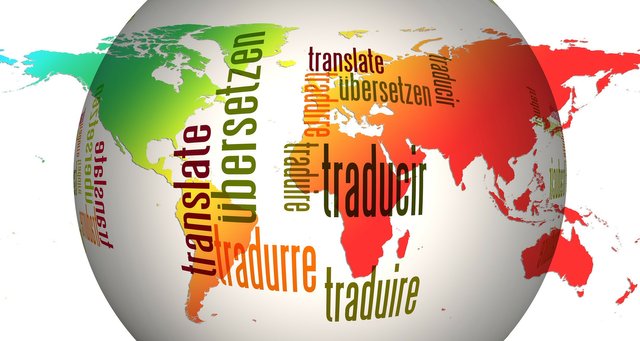Blockchain Jargon: A Professional Translator Might be Needed
If you love (or are a part) of the tech world, then you’ve probably had some challenging conversations when you've tried to explain your passion to people. This is also true of people who have jumped into the Blockchain revolution as well. Most people have less than stellar results when they try to communicate those concepts to their non-technical friends and family. What you usually receive after your brilliant explanation (that included all the latest in technofantastical buzzwords) is a blank stare. When it comes to explaining blockchain and/or almost any technology, your native language, is probably not going to sound the same as the techno-babble they hear rolling off of your tongue.

Erasing the blank stare is all in the translation.
“I AM speaking in plain English! (or Spanish, Chinese, Swedish, Telugu, Euskara). Why do I need a translator?!”
That’s the question isn’t it? Tech Pros the world over can’t understand why they are not getting through. Their friends, family and business associates who don’t have the experience and knowledge cannot grasp the wonder and intricacies of the Tech Pros passion. Sometimes it's crucial that they understand, especially in the business world.
Minda Zetlin co-author of "The Geek Gap: Why Business and Technology Professionals Don't Understand Each Other and Why They Need Each Other to Survive", Looked at the question this way "It's a question that bedevils every tech professional: How do you help business colleagues with no technical training and limited exposure to technology management understand the complex issues you deal with every day?"
A group of professors at a college in Minnesota thought it was so important they wrote a paper on the subject and developed a 5 step method.
- Standardize the technical language
- Produce a nontechnical version
- Test the nontechnical version with lay readers to determine where the translation was unsuccessful
- Determine the reading-grade level of the translation
- Statistically correlate the accuracy of the translation with the original
They went on to test their method with 200 educational objectives in the mental-health field.*
Jerry Foster CTO of Plex has his own five-step strategy that he implements when he speaks. He stated in an article on Enterprisers Project**, "As CTO, I do a significant number of presentations to a wide variety of audiences that differ vastly in experience, age, vocation, and technical skill. The only assumption I make is that my audience is smart."
Foster's approach is specific to public speaking, though I imagine he adjusts it when he is speaking to people in small groups or one on one.
Foster's five step strategy includes...
- Know your Audience
- No jargon. No buzzwords
- Watch your Audience
- Make them Feel Comfortable
- Use a Whiteboard
You can Become a Translator
My approach incorporates some of the elements of both strategies. The difference is my focus is not on presentations but on regular, day to day conversations. It also only has 4 elements and it’s… not as technical.

PRIMUS: Know your people. Here are some questions to ask yourself.
- Who are you talking to?
- Are they remotely interested in what you have to say?
Foster said it this way, "I try to determine their level of expertise beforehand and then start talking at a level slightly below where I think they are."
If you know where they are coming from and what they already understand, you can build on that foundation. Foster is right, you should dig right under that foundation. It’s imperative to start below where you think they are in their knowledge. When the level of the conversation starts over their heads, chances are, they won’t ask questions. They don’t want to look like an idiot. However, they will get bored.
If you start below where you believe their knowledge foundation lies, they will probably feel smart. It can also help if you start by saying, "You probably already know this..."
SECUNDUS: Get Vulgar.
Did you know that 500 years ago the word “vulgar” meant common and usually referred to language. The language of the common people. So, you will want to get vulgar. Don’t use any of those technofantastical buzzwords. Your friends and family don’t give a rat’s ass how big you think your effing brain is. In order for the language barrier to be broken down you have to be willing to find common ground. Your willingness to break it down for people WITHOUT being a smug douche will go along way. (Was that vulgar enough?)
TERTIUS: Find the common ground.
This is vital. Mastering this part of the process changes everything when it comes to being a translator. Let’s say I’m speaking to my friend Pete about blockchain tech. Pete owns a coffee shop. He only sources his coffee from small independent farmers from around the world. The common ground is the independent farmers that are spread across the globe. That’s the starting point and I can build from there. Each batch of coffee he roasts is unique, even if it has the same beans from the same farm. Each block is unique even if it has some of the same info from the previous block… and on it goes. The more common ground you find the easier it will become. Common ground is everywhere. It’s common.
QUARTUS: Pay attention to nonverbal cues in the conversation.
If you see people start to fidget - fingering their phone, glancing at one another in the hopes of making eye contact with anyone but you, the conversation is in trouble. Foster put it this way, "Most people will smile and make some kind of eye contact when they are engaged in the conversation." If you seem to be losing them, refocus - jump back to element three (tertius) and find that common ground again. If you become exasperated, things will go downhill fast. Which leads me to the second part of quartus.
Pay attention to your OWN nonverbal cues.
Now I know, that most of you do NOT have this issue. However, if you do, you should take a look at the following questions.
- Are you rolling your eyes when someone asks a question?
- Do you sigh with exasperation when they give you a blank stare?
- Do your tilt your head and sneer in your best ass-hat manner when someone looks lost in the midst of your discourse?
If these are some of your challenges, the conversation isn’t in trouble, it’s doomed. These are all signs of condescension and that will almost always lead to an end of the conversation and a lost opportunity.
Why does this matter?
Well in some cases it might not.
At the same time, what if you are in a career where tech plays a central role? The ability to translate tech to your co-workers, your boss or a potential client can have an enormous impact on your career. Particularly, if they need to understand the tech in order to do their job or purchase your product.
If you are involved in the latest, cutting-edge blockchain technology and you know it can revolutionize the world in astounding ways, that might be important to you as well. Maybe you want them to recognize and embrace the possibilities that you see.
If any of the above is true, then I would encourage you to know your people better, get vulgar, find the common ground and pay attention.
POSTSCRIPT: If you need help finding common ground with friends or family, feel free to reach out and I’ll see if I can help.
POST-POSTSCRIPT: Special thanks to inspiration from the minds of Jerry Foster and Mindy Zetlin.
*POST-POST-POSTSCRIPT: For a laugh... https://steemit.com/eos/@seanxa/how-to-explain-blockchain-to-your-mother
~* https://ieeexplore.ieee.org/document/6447799/
~** https://enterprisersproject.com/article/2016/6/5-simple-steps-communicating-it-concepts-non-technical-audience
"Did you know that 500 years ago the word “vulgar” meant common and usually referred to language. The language of the common people. So, you will want to get vulgar." - so I just learned something new :D
Communication is key in so many areas, one can never learn to much about it. Thanks for putting this together :D
Nice work!! I have definitely been on the learning end of those kinds of conversations and when someone is good at reading those non-verbal cues and adjusting the message, it does work.
Congratulations @seanxa! You have completed some achievement on Steemit and have been rewarded with new badge(s) :
Click on the badge to view your Board of Honor.
If you no longer want to receive notifications, reply to this comment with the word
STOP